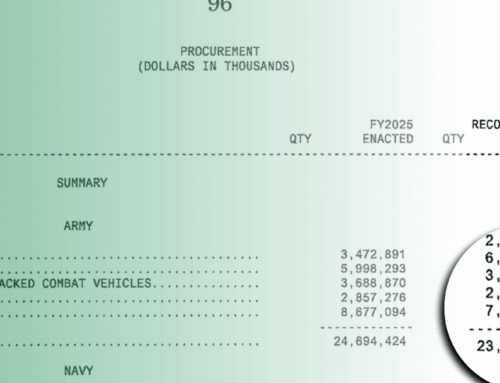Every year we start with hope in our hearts: maybe this year will mark the comeback for fiscal conservatives. Maybe this year, with inflation raging and the public share of U.S. debt surging, lawmakers will put the brakes on runaway spending.
But, as the poet Robert Burns told us, suspense is worse than disappointment. The President’s Budget Request for Fiscal Year 2023 (FY23) included $773 billion for the Pentagon, the so-called “051 account,” and a whopping $827 billion in overall national security spending (the 050 account). You can read about what those different accounts entail and view a chart with all the numbers for FY23, here. That’s a fair amount of money by anyone’s reckoning.
Lawmakers who call themselves fiscal conservatives used to believe national security spending deserved the same amount of scrutiny as all other federal accounts. The so-called “peace dividend” at the end of the Cold War saw money being shifted from Pentagon accounts and spent on other national priorities. Pentagon procurement scandals warranted actual oversight and Congressional actions to correct the underlying issues. But, something happened on the way to the bank and suddenly the national credit card is regularly used in service to the notion that national security accounts are off limits to debate, scrutiny, or just old-fashioned common sense.
Still, we take up the cudgel every year and hope for a return to fiscal sanity in Pentagon spending. When this year’s National Defense Authorization Act (NDAA) was being debated in the House last week, we supported a number of amendments offering some common sense on both spending and oversight of the Pentagon budget. Among the amendments we supported and how they fared:
#166, offered by Reps. Lee (D-CA), et al, to reduce the authorized Pentagon topline by $100 billion was debated on the House floor but ultimately lost on its vote.
#169, offered by Reps. Lee (D-CA), et al, to reverse the House Armed Services Committee action to increase the authorized topline by $36.9 billion also lost during a vote on the House floor.
#261, a bipartisan amendment offered by Rep. Spanberger (D-VA) and Rep. Meijer (R-MI) to require a report on the infrastructure currently in place to oversee U.S. assistance to Ukraine was accepted on the House floor. TCS previously led a group of fiscal conservatives asking for increased oversight. We look forward to learning more details on how these billions of your tax dollars are being spent.
#277, offered by Rep. Schweikert (R-AZ) to reverse the House Armed Services Committee action to add an inflation increase to the authorized topline, with the exception of those accounts related to quality of life. Rep. Schweikert’s office estimated the savings to be in the range of $6 billion. Unfortunately, this amendment was never debated or voted upon. TCS President Steve Ellis pointed out, in our latest podcast, that sensible, middle-ground amendments like this are often opposed by leadership because they are afraid the amendment will actually pass if it’s put to a vote. That’s politics, but it’s not good for your wallet.
#400, offered by Rep. Jayapal (D-WA), et al, to strike the statutory requirement for so-called Unfunded Priorities Lists. We have long railed against this expensive practice of requiring virtually every subset of the Pentagon to make an end run around the President’s Budget Request. This amendment would have allowed the practice to continue but removed the statutory requirement to produce the lists. Unfortunately, this sensible, middle-ground approach lost on the House floor.
#467, offered by Rep. Foxx (R-NC) to establish an Inspector General for the Office of Management and Budget. This just makes sense. The organization making all high-level funding decisions for the federal government should have the type of oversight that only an Inspector General can provide. We’re pleased House leadership agreed to make it part of the bill.
#569, offered by Rep. Smith (D-WA), et al, to allow the United States Navy to retire nine Littoral Combat Ships (LCS). Again, we’ve written about this issue a lot. And we led a group of fiscal conservatives in sending a letter in support of the amendment to every House Republican. A recorded vote came close to passing in the full House, but ultimately this amendment to do what the Chief of Naval Operations asked fell to Congressional parochial interests.
#618, offered by Rep. Escobar (D-TX), to extend the authority of military service Inspectors General to cover their National Guard components. Another attempt to sharpen oversight at the Pentagon, unfortunately this amendment was not allowed to come to the House floor for action.
#701, offered by Rep. Biggs (R-AZ) to reduce the Pentagon budget by .5% until it successfully passes a financial audit. This amendment, which we have supported before, was blocked from coming to the House floor.
So, of the nine amendments we supported related to fiscal conservatism and greater oversight in Pentagon spending, seven failed to make it into the final House version of the Pentagon policy bill. Just two, establishing an Inspector General at the Office of Management and Budget and promoting oversight of U.S. spending in Ukraine were accepted.
But, we’ll continue to take up the cudgel and fight for the interests of American taxpayers. And we won’t leave you in suspense.










